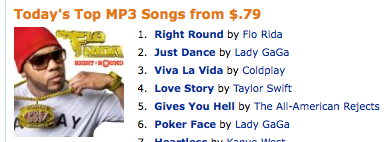Last week we went to go see The Swell Season, the traveling name of Glen Hansard and Marketa Irglova’s band. If you don’t know who they are, go get the DVD for the movie Once and watch it immediately. The story behind the movie is pretty incredible in and of itself, so be sure to read that, too.
The concert was at Meymandi Concert Hall, and judging from the sound in our seats at the back of the upper balcony, otherwise known as the worst seats in the house, the acoustics of the room are impressive. Hansard sang the first song of the concert without a microphone or amplification of any kind, and we could hear him perfectly well from the very back. The view was not quite as good, I could barely see what the people on stage were doing.
The bad seats were the result of bad user experience. I knew what day the tickets were going on sale but I could not find them on the Ticketmaster web site. A couple of days later, I found a way to buy them going a completely different route, and judging from the seats, I was lucky to get them at all.
One thing that surprised me was the number of people taking pictures and video with their mobile phones. Trying to take pictures of a backlit subject in a dark room from a long way away with a non-zoom lens just isn’t going to work, people. I’m sure all of the pictures came out as white blobs in the center of a black field, but people were undeterred. There was also some guy a couple of rows up texting on his phone throughout the concert. All of these shenanigans would be fine except that a glowing mobile phone screen is really distracting. Just put your phone on vibrate and leave it your pocket during the concert. Thanks.
When we left the concert, at the merch table there were a bunch of cards provided by playedlastnight.com, a site that sells recordings of the concert you just attended. With the code on the card, you can buy the recording (in MP3 format) for $6, which seems to be a steal. They don’t have the recording of the show available for download quite yet, but when they do I’ll certainly buy it. This seems like a really nice way for bands to supplement their income, and I was surprised to see that the only two bands on the site right now are Iron & Wine and The Swell Season. I suspect there are other sites doing the same thing, but I don’t know about them.
Overall, this show left me wanting to go see more shows. If you have a chance to see The Swell Season, don’t miss it. The overall level of showmanship and audience engagement was outstanding.


What would an economist do?
I really want to buy the new Neko Case album, released last week, but I have a suspicion that Amazon.com is going to make it the deal of the day sometime soon. What would an economist tell me? On one hand, it’s only $7.99, and it would probably be on sale for $1.99 (or $3.99, the daily deal price for most new releases). On the other hand, if I buy it for full price and they put it on sale a few days later, I’ll feel a tinge of regret. On one hand I want it now, on the other, I have the whole rest of my life to listen to it either way.
I’m pretty sure that any economist would tell me that every minute I’ve spent trying to time the market for this album has been wasted.